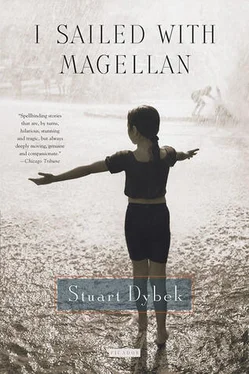It’s an afternoon when the place is empty. Just Zip and, on the TV above the bar, Jack Brickhouse, the play-by-play announcer for the Cubs. The Cubbies are losing again, this time to the Pirates. It’s between innings, and Brickhouse says, It’s a good time for a Hamm’s, the official beer of the Chicago Cubs.
“Official,” Zip says to Brickhouse, “that’s pretty impressive, Jack.”
To the tom-tom of a tribal drum, the Hamm’s theme song plays: “From the land of sky blue waters,” and Zip hums along, “from the land of pines, lofty balsam comes the beer refreshing, Hamm’s the beer refreshing …”
Hamm’s is brewed in Wisconsin. Zip has a place there, way up on Lac Courte Oreilles in the Chain of Lakes region famous for muskies. It’s a little fisherman’s cottage no one knows he has, where he goes to get away from the city. A land of sky blue waters is what Zip dreamed about during the war. Daydreamed, that is. If Zip could have controlled his night dreams, those would have been of sky blue water, too, instead of the nightmares and insomnia that began after he was wounded and continued for years. Sometimes, like last night, Zip still wakes in a sweat as sticky as blood, with the stench of burning flesh lingering in his nostrils, to the tremors of a fist hammering a chest — a medic’s desperate attempt to jump-start a dead body. No matter how often that dream recurs, Zip continues to feel shocked when in the dark he realizes the chest is his, and the fist pounding it is attached to his missing right arm.
When he joined the Marines out of high school, his grandmother gave him a rosary blessed in Rome to wear like a charm around his neck and made him promise to pray. But Zip’s true prayer was one that led him into the refuge of a deep northern forest, a place he’d actually been only once, as a child, on a fishing trip with his father. He summoned that place from his heart before landings and on each new day of battle and on patrol as, sick with dysentery, he slogged through what felt like poisonous heat with seventy pounds of flamethrower on his back. He’d escape the stench of shit and the hundreds of rotting corpses that the rocky coral terrain of Peleliu made impossible to bury, into a vision of cool freshwater and blue-green shade scented with pine. When I make it through this, that’s where I’m going, he vowed to himself.
Sky blue water was the dream he fought for, his private American Dream. And so is the Zip Inn, his tavern in the old neighborhood. He’s his own boss here. Zip uncaps a Hamm’s. It’s on the house. The icy bottle sweats in his left hand. He raises it to his lips, and it suds down his throat: he came back missing an arm, but hell, his buddy Domino, like a lot of guys, didn’t come back at all.
He can’t control his night dreams, but during the day, Zip makes it a practice not to think about the war. Today, he wishes for a customer to come in and give him something else to think about. Where’s Teo, that odd Mexican guy who stops by in the afternoon and sits with a beer, humming to himself and writing on napkins? The pounding in his temples has Zip worrying about his blood pressure. He has the urge to take a dump but knows his bowels are faking it. The symptoms of stress bring back Peleliu — the way his bowels cramped as the amtrac slammed toward the beach. They lost a third of the platoon on a beachhead called Rocky Point to a butchering mortar barrage that splintered the coral rock into razors of shrapnel. Zip stands wondering, how does a man in a place so far from home summon up whatever one wants to call it — courage, duty, controlled insanity — in the face of that kind of carnage, and then say nothing when two goombahs from across Western Avenue come into his place, the Zip Inn, and tell him it would be good business to rent a new jukebox from them? Instead of throwing those parasites out, he said nothing. Nothing.
Only a two-hundred-dollar initial installation fee, they told him.
The two of them smelling of aftershave: a fat guy, Sal, the talker, and Joe — he’d heard of Joe — a psycho for sure with a Tony Curtis haircut and three-day growth of beard, wearing a sharkskin suit and factory steel-toes. The two hoods together like a pilot fish and a shark.
“Then every month only fifty for service,” fat Sal said, “and that includes keeping up with all the new hits. And we service the locked coin box so you won’t have to bother. Oh yeah, and to make sure nobody tries to mess with the machine, we guarantee its protection — only twenty-five a month for that — and believe me when we say protection we mean protection. Nobody will fuck with your jukebox. Or your bar.”
“So you’re saying I pay you seventy-five a month for something I pay fifteen for now. I mean the jukebox don’t net me more than a few bucks,” Zip told them. “It’s for the enjoyment of my customers. You’re asking me to lose money on this.”
“You ain’t getting protection for no fifteen bucks,” Sal tells him.
“Protection from what?” Zip asked.
The hoods looked at each other and smiled. “Allora.” Sal shrugged to Joe, then told Zip, “A nice little setup like you got should be protected.”
“I got Allstate,” Zip said.
“See, that kind of insurance pays after something happens, a break-in, vandalism, theft, a fire. The kind we’re talking here guarantees nothing like that is going to happen in the first place. All the other taverns in the neighborhood are getting it too. You don’t want to be the odd man out.”
“A two-hundred-dollar installation fee?” Zip asked.
“That covers it.”
“Some weeks I don’t clear more than that.”
“Come on, man, you should make that in a night. Start charging for the eggs,” Sal said, helping himself to one. “And what’s with only six bits for a shot and a beer? What kinda businessman are you? Maybe you’d like us to set up a card game in the back room for you on Fridays. And put in a pinball machine. We’re getting those in the bars around here, too.”
“Installation was fifty for the box I got. Service is fifteen a month.”
Joe, the guy in the sharkskin suit, rose from his barstool and walked over to the jukebox. He read some of the selections aloud: “Harbor Lights,” “Blue Moon,” the “Too Fat Polka,” “Cucurrucucu Paloma,” “Sing, Sing, Sing.”
“These songs are moldy, man,” Joe said. “Where’s Sinatra, where’s Elvis the Pelvis? Your current jukebox dealer’s a loser. They’re gonna be out of business in a year. Their machines ain’t dependable. Sallie, got a coin?”
“Here, on me,” Zip said, reaching into the till.
“No, no, Sallie’s got it.”
“Yeah, I got it,” Sal said, flipping a coin to Joe.
“Requests, Mr. Zip?” Joe asked.
“I hear it anytime I want.”
“So, what’s your favorite song?”
“Play, ‘Sing, Sing, Sing,’” Sal said, yolk spitting from his mouth. “Did you know Benny Goodman’s a yid from Lawndale? Lived on Francisco before the tutsones moved in.”
Joe dropped in the coin and punched some buttons. Zip could hear from the dull clunk that the coin was a slug.
“Goddamn thing ate my quarter!” Joe exclaimed. “I fucken hate when machines snitch from me. Newspaper boxes are the worst. Selling papers used to be a job for blind guys and crips. No offense, Mr. Zip, I’m just saying a paper stand was decent work for these people, and then they put in newspaper boxes. I’m trying to buy a Trib the other day and the box eats my quarter. Know what I did to that newspaper box?”
“Here,” Zip said. “Here’s a refund.”
“But, see, Mr. Zip, it’s bad business to be covering for these lousy fucking jukes. You know if you whack them just right it’s like hitting the jackpot.” Joe kicked the jukebox knee high and its lights blinked out. From the crunch, Zip knew he’d kicked in the speaker. “No jackpot? Well, guess it ain’t my lucky day.” Joe laughed. “So, listen, Mr. Zip, we got a deal to shake hands on?” Joe extended his hand. Then, eyeing Zip’s clothespinned sleeve, Joe withdrew his right hand and extended his left.
Читать дальше












